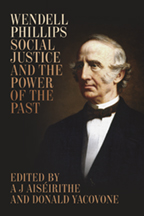
384 pages / 6.00 x 9.00 inches / 14 halftones
Social Studies / Slavery Studies
Born into an elite Boston family and a graduate of both Harvard College and Harvard Law School, white Massachusetts aristocrat Wendell Phillips’s path seemed clear. Yet he rejected his family’s and society’s expectations and gave away most of his great wealth by the time of his death in 1884. Instead he embraced the most incendiary causes of his era and became a radical advocate for abolitionism and reform. Only William Lloyd Garrison rivaled Phillips’s importance to the antislavery and reform movements, and no one equaled his eloquence or intellectual depth. His presence on the lecture circuit brought him great celebrity both in America and in Europe and helped ensure that his reputation as an advocate for social justice extended for generations after his death.
In Wendell Phillips, Social Justice, and the Power of the Past, the world’s leading Phillips scholars explore the themes and ideas that animated this activist and his colleagues. These essays shed new light on the reform movement after the Civil War, especially regarding Phillips’s sustained role in Native American rights and the labor movement, subjects largely neglected by contemporary historical literature. In this collection, Phillips’s views on matters related to race, ethnicity, gender, and class serve as a lens through which the contributors examine crucial social justice questions that remain powerful to this day. Tackling a range of subjects that emerged during Phillips’scareer, from the effectiveness of agitation, the dilemmas of democratic politics, and antislavery constitutional theory, to religion, violence, interracial friendships, women’s rights, Native American rights, labor rights, and historical memory, these essays offer a portrait of a man whose deep sense of fairness and justice shaped the course of American history.
A J Aiséirithe is director of the Wendell Phillips Bicentennial Project.
Donald Yacovone is an associate at the Hutchins Center for African and African American Research at Harvard University.Found an Error? Tell us about it.